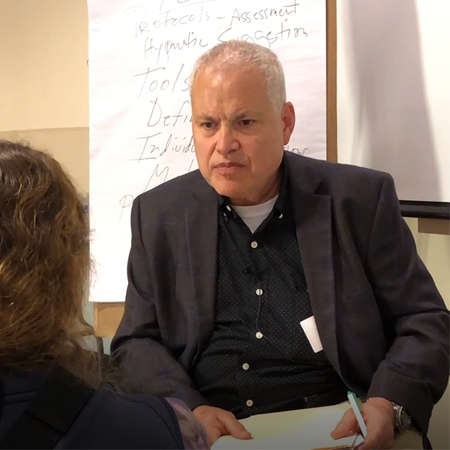By Bruce Eimer, Ph.D., ABPP
Chronic pain is one of the greatest clinical challenges in modern healthcare. It strains the nervous system, erodes emotional resilience, disrupts functioning, and often leaves patients feeling discouraged after years of unsuccessful treatments. As clinicians, we meet individuals who have tried conventional medical procedures, injections, surgeries, medications, physical therapy, and yet continue to suffer.
The good news is that pain is not only a physical phenomenon—it is also profoundly influenced by the brain, the mind, and the meaning a person attaches to their experience. And this is precisely where hypnosis excels.
For decades, clinical hypnosis has been one of the most underutilized yet evidence-supported methods for treating chronic pain. It is recognized by the APA, the NIH, and the Society for Clinical and Experimental Hypnosis as an effective, ethical therapeutic modality. Yet many clinicians have never received proper training in how to use hypnosis competently and confidently.
That gap is exactly why I created my video course,
“Hypnosis for Pain: Principles and Practice.”
The course introduces clinicians to the science, the art, and the clinical methods of using hypnosis for pain management—so you can begin integrating it into your practice immediately and safely.
But before I talk about the course, let me share why hypnosis matters.
Clinical Hypnosis: A Missing Link in Pain Care
Chronic pain is not simply ongoing tissue damage.
For many clients, it becomes a neuroplastic loop shaped by:
- Sensitized nerve pathways
- Heightened attention to pain
- Fear-avoidance behaviors
- Emotional distress
- Learned pain responses
- Autonomic dysregulation
Hypnosis works directly with these mechanisms.
Here’s what hypnosis can do:
1. Reduce pain intensity
Through sensory modulation, dissociation, and hypnotic analgesia.
2. Dampen autonomic overarousal
Helping the brain shift out of fight/flight and into parasympathetic calm.
3. Interrupt fear-pain loops
Allowing patients to move, breathe, and live with greater freedom.
4. Improve mood, sleep, and coping
By strengthening resilience and reducing secondary suffering.
5. Empower patients
Providing tools they can use outside of session.
These are not placebo effects or temporary distractions—they are measurable changes in neural processing, attention, and pain perception.
For clinicians trained in hypnosis, the benefits stretch even further: greater therapeutic rapport, more efficient sessions, and a powerful ability to help clients regulate their nervous system.
Why I Developed This Course
After decades of treating chronic pain as a psychologist, hypnotherapist, and pain specialist, I saw the same pattern again and again:
Clinicians want to help their patients with pain, but don’t feel equipped.
Many tell me they would use hypnosis if:
- they understood the principles
- they knew how to introduce it ethically
- they had confidence in evidence-based techniques
- they could see demonstrations, scripts, and real clinical applications
This course was my way of answering that need—clearly, simply, and practically.
“Hypnosis for Pain: Principles and Practice” gives you a structured introduction not just to what hypnosis is, but how to use it with chronic pain patients starting immediately.
What the Course Covers
✔ Foundations of Pain Psychology
Understanding acute vs. chronic pain, central sensitization, neuroplasticity, and the emotional/cognitive dimensions of pain.
✔ What Hypnosis Is (and Isn’t)
How trance states work, the science behind hypnotic analgesia, and myth-busting common misconceptions.
✔ Core Hypnotic Skills for Pain Relief
Including:
- Inductions
- Deepening methods
- Analgesia techniques
- Glove anesthesia
- Pain transformation imagery
- Sensory modulation
- Ego-strengthening
- Posthypnotic suggestions
✔ How to Structure a Pain-Focused Hypnosis Session
Step-by-step session flow, assessment considerations, and tailored scripts.
✔ Demonstrations and Case Examples
Real-world applications and clinical conversations that model best practices.
✔ Safety, Ethics, and Professional Guidelines
How to practice within scope, obtain informed consent, and integrate hypnosis with existing treatments.
The goal is not to overwhelm clinicians with theory—it’s to give them practical, actionable tools that can be used with chronic pain patients starting the very next day.
Who the Course Is For
This program is ideal for:
- Psychologists
- Licensed mental health clinicians
- Clinical social workers
- Professional hypnotherapists
- Physicians
- Nurses
- Physical and occupational therapists
- Any healthcare provider interested in mind–body approaches
No prior hypnosis experience is required.
The course starts with fundamentals and builds to clinical application.
Why Hypnosis Belongs in Your Clinical Toolkit
Every clinician knows the frustration of watching a patient suffer despite doing everything “right” medically. Hypnosis offers another path—one grounded in evidence, physiology, and the human capacity for self-regulation.
When used skillfully, hypnosis can become:
- a pain-relief tool
- a nervous system reset
- a coping strategy
- a resilience-building method
- a pathway to improved functioning and quality of life
Most importantly, it gives patients a sense of agency and self-efficacy—something chronic pain often strips away.
If You’re Curious to Learn More
If you’ve been thinking about expanding your therapeutic skills…
If you work with patients who live with chronic pain…
If you’re simply curious about integrating hypnosis into your practice…
My course, “Hypnosis for Pain: Principles and Practice,” is a clear, accessible place to start.
It isn’t a high-pressure sales pitch disguised as education.
It’s a thoughtful, clinically grounded training created to help professionals like you feel more effective, confident, and prepared to address one of the toughest challenges in healthcare.
Psychologists who complete this course will earn 16 CE credits.
Bruce Eimer, Ph.D., LLC is approved by the American Psychological Association to sponsor Continuing Education for psychologists. Bruce Eimer, Ph.D., LLC maintains responsibility for this program and its content.
If you’d like to explore it further, you can read more about the course and see whether it resonates with your clinical style and interests.







